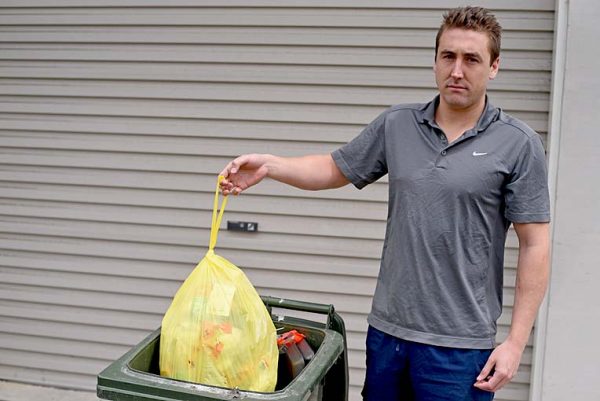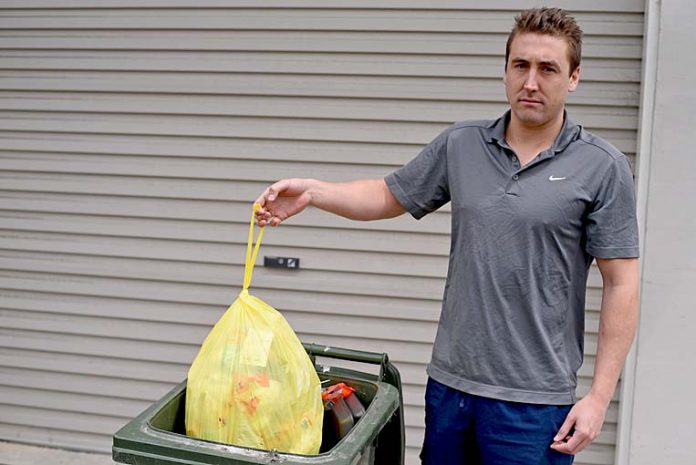
MOUNT Gambier City Council is considering a significant overhaul of its kerbside bin collection schedule in a bid to reduce the amount of waste heading to landfill.
Elected members have foreshadowed but are yet to formally back a targeted trial phase to shift green waste bin collection to a weekly cycle, while the general waste bin would be emptied fortnightly.
It follows a kerbside waste review led by council environmental sustainability officer Aaron Izzard, with the report taken out of confidence during Monday night’s Economic and Environment Committee meeting.
Mr Izzard said Mount Gambier’s kerbside general waste bins contain a significant proportion of material that should not be going to landfill and should be composted or recycled instead.
As a result, the report recommended council change the configuration of its kerbside collection system.
“Changing the configuration of the kerbside bin system to best practice, with associated large scale community education, is likely to deliver the greatest reductions in organic waste and recyclables,” the report stated.
“Best practice kerbside bin collection system consists of weekly organics, fortnightly general waste and fortnightly recycling.”
If supported at this month’s council meeting, the trial is foreshadowed to take place at a sample of streets in 2020/21 to gather data for a full roll-out of the system in 2021/22.
The report also recommended council provide the green organics kerbside service to all properties who want it, at a one-off charge of $85 per property to cover the cost of a bin.
The mooted trial has received mixed feedback on The Border Watch’s Facebook page in recent days, with resident Ben Papps among those who do not believe the suggested solution will fix the problem.
“I still think the general waste would fill up over the two weeks quickly in some houses even if people were doing the right thing,” he said.
“This would lead to the same problem they are having where people are forced to put waste into the wrong bins because the little bin is full.”
Mr Papps also raised concerns for those who lead busy lives and on occasions forget to put their bins out.
“Admittedly, I have forgotten to put the general waste bin out before and if I was to forget under the new system they are floating, it would mean my bin is not collected for a month,” he said.
“For people who do fill their general waste bin easily, where is that rubbish going to go? More of it will probably end up in the streets and in the forests.”
However, Mr Izzard said bin audits had consistently shown over 35pc of Mount Gambier’s general waste contained food waste, a further 9pc was garden organics and over 25pc was recyclables.
“If people put things in the right bin then the volume in their general waste bin should reduce by almost 70pc,” Mr Izzard said.
“This leaves more than enough space even for a fortnightly general waste collection.”
Mr Izzard also addressed a possible community concern that not collecting a general waste bin for a fortnight would lead to strong odours.
“In fact, the material that causes the vast majority of odours in general waste bins is food waste,” Mr Izzard said.
“If this is put in the weekly organics bin as it should be, then there would be minimal residual odour in general waste bins.”
Council chief executive officer Andrew Meddle said the local government body was preparing a significant community education program in relation to waste, starting next year.
“We have $80,000 in the budget line for an education program that will be rolled out after Christmas,” he said.
“Education is key – if the waste bin is filling up quickly, that is telling me that people are putting the wrong stuff in the wrong bin.”
If the council elects to go down this path of waste collection, Mr Meddle said it would not be the first.
“Historically this council has been a leader in waste… we have some great facilities here, however it seems we are now lagging behind some other councils across the state,” he said.
“There are a number of councils in the metropolitan Adelaide region which have already successfully implemented this strategy as well as a number of others across Australia.
“It is also common practice in Europe.”
Changing the configuration of the kerbside collection system would have some cost implications for council, with the largest impact to be the loss of revenue from not charging for the service.
Council will also consider providing hard waste kerbside pickups or free Waste Transfer Station vouchers in the future at its November 19 meeting.








